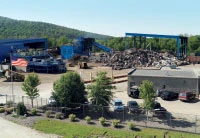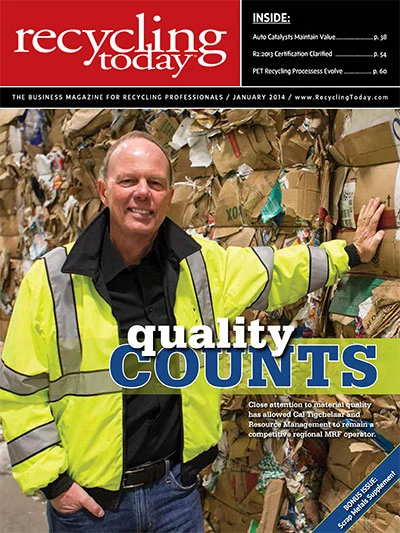
 In early 2013, the Chinese government launched Operation Green Fence, its multiagency effort to more closely manage the import of containerized scrap imports and to keep out undesirable material.
In early 2013, the Chinese government launched Operation Green Fence, its multiagency effort to more closely manage the import of containerized scrap imports and to keep out undesirable material.
Recyclers who ship materials to China have witnessed Green Fence’s scrutiny in the past year, from delayed transactions to uncertainty as to whether shipments would be rejected.
Of the various metals commonly shipped to China, zorba has been scrutinized because of its nature. Zorba, as defined by the Institute of Scrap Recycling Industries Inc. (ISRI), Washington, D.C., is made up of shredded mixed nonferrous metals consisting of primarily aluminum—as well as some copper, lead, magnesium, stainless steel, nickel, tin and zinc—generated by eddy current, air separation, flotation, screening or other segregation techniques.
While shipments of zorba do not generally contain excess liquids, they could be rejected if inspectors see items such as circuit boards, lead-coated copper cable or ballasts in loads.
As a result of Operation Green Fence, zorba buyers in China have become very picky and cautious, says Bureau of International Recycling (BIR) Ambassador for China David Chiao of Uni-All, which is based in Atlanta.
Zorba demand is generally down in southern China and supply is lower than average, he says.
Chiao, who is based in China and also on the board of CMRA (China Nonferrous Metals Industry Association), says zorba buyers are afraid of violating Green Fence, but that does not stop some importers. “Some importers still would willingly take the risk of importing high-waste contaminated zorba,” he says.
To comply with Green Fence and to obtain the highest-quality shipments of the recovered nonferrous fraction, Chiao says buyers should stop purchasing low-quality and contaminated containers of the material. “We have to give up buying lower-grade zorba and quit buying from those manufacturers that don’t produce good quality,” he adds.
Improved recovery
The lower-grade material that Chinese officials have rejected under Green Fence throughout 2013 has been a blow to the zorba market, says Adam Weitsman, owner of Upstate Shredding, headquartered in Owego, N.Y.
“I think [Green Fence] hurt the zorba market because there is more of the material on the market. Material that was lower grade was stuck with nowhere to go,” Weitsman says. “So then that material was dumped on the domestic market, so the [domestic consumers]of zorba had a field day because they had an oversupply being offered to them.”
|
Upstate shredding to install shredder in Albany, NY Upstate Shredding, Owego, N.Y., has bought a metal shredder and downstream sorting system for its scrap yard and port facility in Albany, N.Y. The company opened the yard in August 2013 and says it expects the shredder to be operational by April 18, 2014. Upsate Shredding says the project will represent a total investment of $25 million and is being funded privately by the company. Adam Weitsman, president of Upstate Shredding, says the company did not seek government assistance on the project. “We’ve spent years building our metals recycling network in New York and Pennsylvania into a highly efficient system,” he says. “We have ambitious goals for our Albany yard, and this shredder is the next step in putting that plan of expansion into motion.” Upstate Shredding adds that it also expects to spend several million dollars in the region over the next several years to create and develop a network of recycling facilities to feed the new shredder. “It took us years to build up our feeder yard system around our Owego shredder, and this new shredding location, in addition to our shredder in New Castle (Pennsylvania), which will be operational in the second quarter of 2014, will be the launching pad of the next phase of our expansion,” Weitsman says. The shredder and downstream system will be built by Wendt Corp., Buffalo, N.Y. |
The Chinese initiative has been a “nightmare” for many recyclers, he says. “Guys that wanted to export had to dress up their material. The export protocols are much stricter now.”
One of Green Fence’s goals, Chiao says, is to see higher grades of recovered materials in each container shipment.
To obtain higher-grade zorba, Weitsman says, advancements in technology used to sort mixed nonferrous metals have improved significantly over the years. Outdated methods, such as using manual sorting or sink-float technology, are being replaced by sensor-based sorting systems, eddy currents, air separation and other advanced technology.
“The technology you had five years ago is technology that is now antiquated,” Weitsman says. “Improving production [requires] adding the money to put in the extra technology to keep zorba out of the landfills.”
Zorba that once headed to landfill in auto shredder fluff is now being recovered at a much higher rate because of today’s technology, Weitsman adds. “The technology is making it possible to pull out even more zorba that used to go in a landfill.”
Ship or sell
Weitsman says the United States zorba supply is high, especially with the increase in number of operating shredders in the nation. More shredders are in operation today than ever before, and they are producing a lot of the nonferrous fraction, he says, adding that the U.S. is probably producing more zorba today than at any other time in its history.
He adds that if it weren’t for the profits provided by producing and selling zorba, working in the shredding business “wouldn’t make sense.” The only way to make money in the shredding business today is by refining nonferrous material in the shredded stream, Weitsman says.
Upstate Shredding produces about 3,000 tons of zorba per month, Weitsman says. The company sells 95 percent of the mixed nonferrous metals domestically.
Weitsman says he prefers to ship to domestic consumers rather than deal with exporting his company’s recovered materials. He explains that when exporting zorba, issues can arise with payments, and then there’s the uncertainty of the market’s stability.
Weitsman also has a personal negative experience that occurred while exporting zorba in the late 1990s: A Belgium company had purchased more than 100 loads of zorba using fake documents, and after the company went bankrupt Upstate Shredding was a couple of million dollars in the hole, he says.
“I’d much rather ship domestically because I think domestic is reliable. I’ll sell a penny or two cheaper going domestic just to have the peace of mind in case the market drops,” Weitsman says.
Green Fence, therefore, has not had much of an effect on Upstate Shredding, he admits. But it has resulted in cheaper prices for domestic buyers because of the oversupply, Weitsman says.
Upstate Shredding sells its zorba to Audubon Metals LLC, Henderson, Ky.
“We’re lucky we have a relationship with Audubon, and they do things very ethically,” he says.
Weitsman continues, “We are a large scrap company, and as we grow I want to do a worry-free business. I don’t want to worry about getting paid or claims later on; it is a consistent business.”
Fenced in
As for North American recyclers who do ship zorba loads overseas, Weitsman says they will have to improve the quality of their zorba if they expect to sell the material to Chinese consumers in 2014.
Chiao says recyclers should maintain a higher quality of zorba according to Green Fence guidelines into 2014.
While he says zorba supply may rise in 2014, he predicts China’s demand will fall if the strict specifications remain in place.
“The demand from China will be less if President Xi continues to tighten import policies,” Chiao says. “It is still too early to tell, but I believe government policymakers will continue tightening on import scrap.”
Other than Green Fence, Chiao says the Chinese currency exchange rate will continue to appreciate, which will play a role in export of zorba from the U.S. in 2014. China’s financial market also will continue to be tightly controlled, he says.
Weitsman adds that feedstock prices will help determine the zorba market in the next year. “If the market for ferrous stays up, then the flow to shredders will stay strong, and that will keep the zorba supply strong. If they drop, it will slow up feedstock to the shredders, and in turn less zorba will be produced.”
The author is associate editor of Recycling Today and can be reached at mworkman@gie.net.

Explore the January 2014 Issue
Check out more from this issue and find your next story to read.
Latest from Recycling Today
- Astera runs into NIMBY concerns in Colorado
- ReMA opposes European efforts seeking export restrictions for recyclables
- Fresh Perspective: Raj Bagaria
- Saica announces plans for second US site
- Update: Novelis produces first aluminum coil made fully from recycled end-of-life automotive scrap
- Aimplas doubles online course offerings
- Radius to be acquired by Toyota subsidiary
- Algoma EAF to start in April





